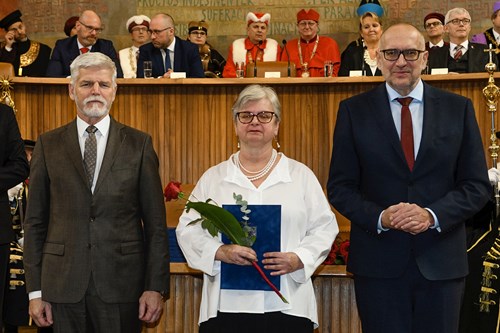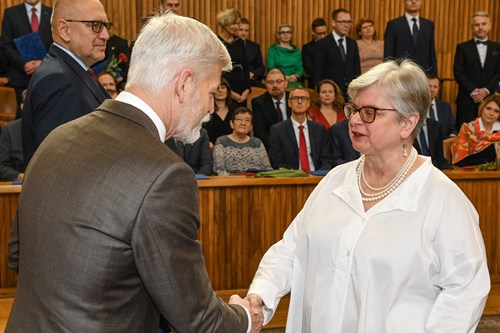
Interview with Bernadette Nadya Jaworsky - full professor, Department of Sociology
On Tuesday, December 12, 2023, President of the Republic Petr Pavel personally handed over appointment decrees to professors at universities and Bernadette Nadya Jaworsky was one of them. We had a privilege to interview her and find more information about her academic career.
Interviewed by Nicolas Navas
- How did you start your academic career?
There's a bit of a story to that because I was 40 years old when I went back to school to get a bachelor’s degree. I went to art school at the traditional age and then ran away to Italy from art school. Subsequently, I went into business with my ex-husband. We were in business for a number of years, and I kept wanting to go back to school. However, I couldn't think of what to study or what I wanted to do. Finally, around 2000, I started thinking about it seriously and decided I wanted to teach.
I enrolled in an education and American studies program. They gave significant credit for life experiences, and by the end, you'd have a degree in both education and American studies. I took some classes at a local college in the US and met a woman, a teacher of an ethnic studies class, who exclaimed, "What are you doing here? You should be in Wellesley College." I replied, "Really?" I didn't know much about the college, other than its fame for being a women's college, but she managed to get them to consider my late application. Consequently, I went to Wellesley, where I studied sociology and American studies. I kept insisting I was going for American studies to Yale.
While reading the Yale website, I stumbled upon the Center for Cultural Sociology, and it resonated with me. I rushed to one of my mentors, a teacher, and he suggested, "Why don't we get Jeffrey Alexander to come up here and give a talk? You can meet him." I thought, "Fantastic." He came up to Wellesley College, and I talked with him. Subsequently, I applied to four different schools, but I really wanted to go to Yale, and I got in. I was very happy about that. Thus began my serious academic career because it became clear early on that I was a bit heady for middle school or high school students. I realized that university teaching might be the best fit for me. So, I pursued what I felt was my calling—teaching the sociology that I had fallen in love with.
2. How would you explain to people and new students what Cultural Sociology is?
Cultural sociology isn't just the study of culture. When people think of culture, they often consider traditions, customs, and the culture of a country, for example. However, cultural sociology is a way of studying people through their meaning-making processes because people are inherently meaningful creatures.
In traditional times, individuals were known to be more oriented toward culture, magic, and religion, or other similar aspects. Theorists like Max Weber argued that we became more rationalized, bureaucratized, and modernized. However, following Jeffrey Alexander's perspective, it is apparent that people are still meaning-making creatures for whom meaning and emotion matter significantly. Therefore, cultural sociology focuses on studying the ways people make meaning.
What does that actually entail? It involves examining how people think and understand different phenomena in the world. For instance, in my studies on migration, I explore the meanings people attach to the word "immigrant." This includes considerations like what makes a good immigrant or what defines a not-so-good one. Additionally, I study political culture to analyze the meaning making process of the communities dealing with immigration. Regardless of the field, whether it's economics, politics, the market, family, or education, all of these areas are infused with culture because people bring different meanings to concepts like school or the market.
In essence, cultural sociology is the study of how people make meaning and understand the world around them.
3. What was your most exciting research project?
It was actually my dissertation research, which I conducted in the mid-2000s. I earned my PhD in 2011, and to accomplish that, I spent four years in the field conducting ethnographic work. This research took place in a small city in Connecticut, United States, which had undergone a significant transformation due to migration.
In the 1990s, the city was 90% white, but by the end of that decade, it was only 70% white. The people of color who arrived in the city were from Brazil, other places in South America and Central America, and also Ecuadorians. Ecuadorians had a long immigration history due to the hat-making industry centered there. The city had a tradition of attracting immigrants to work in the hat-making business. The rapid transformation in the 1990s sparked extensive debates about immigrants. Some people expressed concerns, stating, “Oh, you go down Main Street, and all the signs are in Spanish and Portuguese. This isn't America anymore.”
The city's population included a significant unauthorized population, individuals who had either overstayed visas or entered the country illegally. I studied the population for over four years. I studied a group that one would call anti-immigrant, which I called the immigration control activists. Another one that you could call pro-immigrant, the immigrant rights activists, and a community newspaper that served as a mediator between the two opposing sides. Both sides disliked the newspaper, considering it to be on the other side, making it a sort of liminal case. I worked in their newsroom throughout that time, attending rallies and meetings because there was substantial activity, as many people in the city were upset about immigrants. Overall, it was a wonderful case study.
4. What is the latest research you are working on?
We just finished with my research team and I - we got a grant from the Czech Science Foundation to work on attitudes toward migration among the Czech public. So, we finished that and now we have a project called: People Like Us? And this is interviewing people that have come from abroad. Whether you want to call them foreigners, migrants, expats, refugees. We're interviewing 6 different groups that have come to Brno, and talking to them about how they perceive institutions, how they perceive Czech people. So, it's like a reversal and we call it reverse sociology. And the other thing that's special about that research is that we're applying a decolonial lens. This is what I presented at a conference about how to decolonize the cultural sociology of migration. We're doing these interviews, about a little over 50 of them, and we've done about 30. We are just in the beginning stages of the project, but we're getting really exciting results.
5. What do you think would be a good advice for those students that are applying or are close to start their studies?
For cultural sociology, they have to think about how people understand things. It's mostly qualitative research, researching how people think about things and how they construct structures of meaning. Part of what we do is something called structural hermeneutics. The structure is what's below what people think, and the hermeneutics is the interpretation that takes place above ground.
I would say, think about your thesis early and focus on researching something you truly enjoy. You're going to spend a whole year with it in the second year of your studies. It should be a topic you're passionate about and want to explore and learn more about.
Additionally, make an effort to talk to your professors. Everyone has office hours, but people often only come when there's a pressing reason to see them. Take advantage of these opportunities. Get to know the different professors and think about who you might want to ask to supervise your thesis. Contact with the professors may seem intimidating, but the professors in this department are very friendly and approachable.

